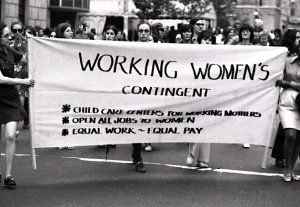
This week, a gaggle of gals in hot pants and minidresses will go on a protracted, highly publicized strike against their employer. They will catch the attention of the highest branches of government. They will win their case, and in so doing, win a huge battle for working women everywhere—ushering in a new push for equal pay for women and striking a victorious blow for women's rights the world over. They will do all of this, of course, on screen. In real life, the news isn't nearly that inspiring.
Ah, the bittersweet serendipity. On Friday, Made in Dagenham, a new film about a group of British women who successfully stood up to sexist labor practices at Ford Motors in the U.K., will hit U.S. theaters. And on Wednesday, the U.S. Senate failed to end debate on the Paycheck Fairness Act. Called a "commonsense law" by President Obama, the bill would have strengthened anti-discriminatory laws put in place by the Equal Pay Act, protected employees from being fired for asking about their colleagues' compensation, and created negotiation-skills training programs for girls and women.
Opponents argued that the act would have been bad for small businesses, that it was unnecessary, redundant, and a vestige of an activist, knee-jerk feminist movement. But that line of thought ignores ample evidence that the pay gap is alive and kicking. The American Association of University Women recently compared women and men with the same education, same grades, same kinds of jobs, and who had made the same life choices—in other words, where all things were otherwise equal—and found that women earn 5 percent less in their very first year out of school. Ten years later, even if they haven't had children, they earn 12 percent less. In another study, Catalyst found that female first-year MBA students earn $4,600 less than their male peers in their very first job. In fact, in the 47 years since the Equal Pay Act was first adopted, the pay gap has decreased from more than 40 cents to just under 25. We are literally halfway there.
The Republican senators voting against the act, including otherwise moderate Susan Collins and Olympia Snowe, both from Maine, said the act would have been bad for business. And they may have been right, but not for the stated reasons. After all, employers who aren't in violation of equal pay laws would have had nothing to worry about. But consider that men have been the victims of this recession in record numbers, to the point that it's frequently called the "mancession" and that it has led to a 36 percent increase in the number of families depending on women's earnings in the last year alone. Sure, those businesses may be saving money by paying those women less than they would have had to pay men, but is it really in the interest of the American public—yes, those small business owners included—to allow them to save at the expense of families? At 77 cents on the dollar, women will lose an average of $431,000 in pay over 40 years. Those losses in income don't just represent money in the bank. That's money that could have been spent, and spent wisely. When you consider that women reinvest 90 percent of their income into their own community and family (vs. just the 30 to 40 percent that men invest), the impact could have been particularly powerful. How's that for common sense?
Back in 1968, the ladies of Dagenham were awarded 92 percent of what their male counterparts were making. "That number sounds pretty good right now," Marcia D. Greenberger, co-president of the National Women's Law Center, said rather ruefully after a Monday-night screening of the film. Indeed. The Senate's failure to pass the act two days later felt like nothing less than a swift kick in the crotch, a reminder that women haven't come nearly as far as we all think. Just before the award is handed down, the film's heroine is asked how she and her colleagues will cope if they don't get their way. "Cope? How will we cope?" she responds. "We're women. Now don't ask such stupid questions." She's right. We'll cope. We always do. But the American economy? On that we're not so optimistic.
Uncommon Knowledge
Newsweek is committed to challenging conventional wisdom and finding connections in the search for common ground.
Newsweek is committed to challenging conventional wisdom and finding connections in the search for common ground.
About the writer
To read how Newsweek uses AI as a newsroom tool, Click here.





